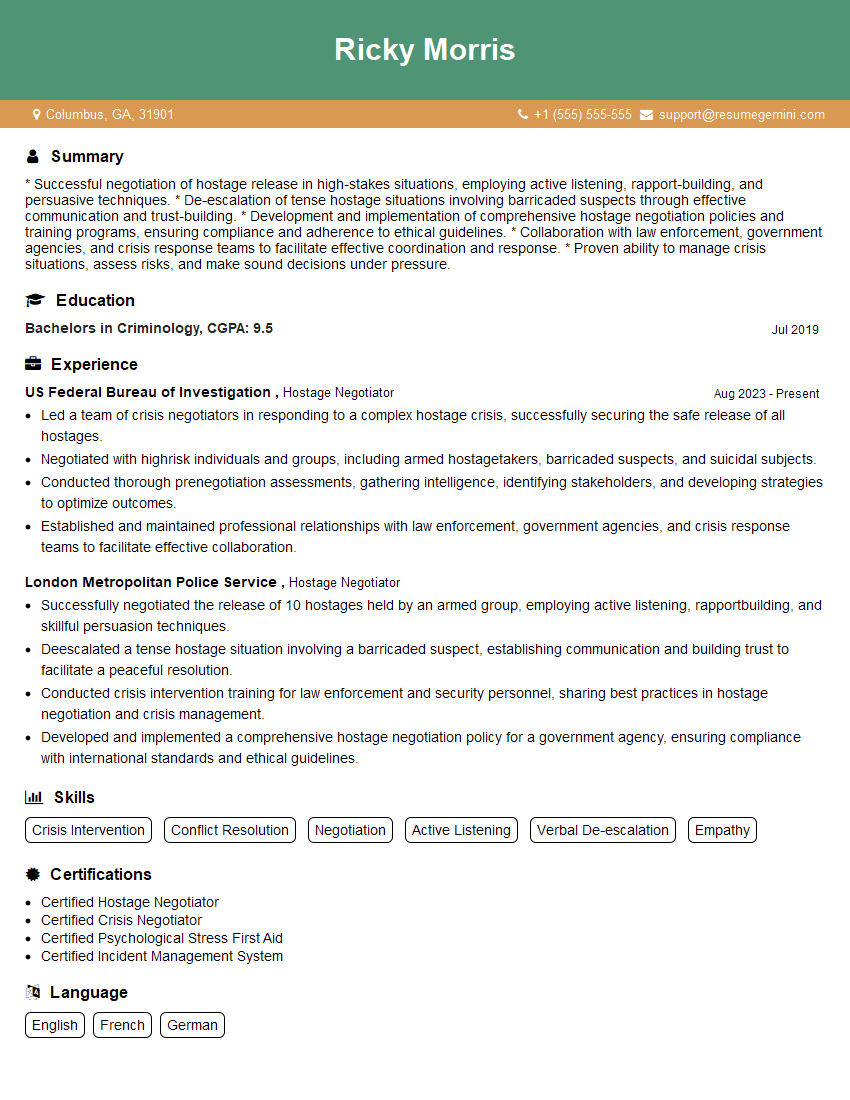Are you a seasoned Hostage Negotiator seeking a new career path? Discover our professionally built Hostage Negotiator Resume Template. This time-saving tool provides a solid foundation for your job search. Simply click “Edit Resume” to customize it with your unique experiences and achievements. Customize fonts and colors to match your personal style and increase your chances of landing your dream job. Explore more Resume Templates for additional options.

Ricky Morris
Hostage Negotiator
Summary
* Successful negotiation of hostage release in high-stakes situations, employing active listening, rapport-building, and persuasive techniques. * De-escalation of tense hostage situations involving barricaded suspects through effective communication and trust-building. * Development and implementation of comprehensive hostage negotiation policies and training programs, ensuring compliance and adherence to ethical guidelines. * Collaboration with law enforcement, government agencies, and crisis response teams to facilitate effective coordination and response. * Proven ability to manage crisis situations, assess risks, and make sound decisions under pressure.
Education
Bachelors in Criminology
July 2019
Skills
- Crisis Intervention
- Conflict Resolution
- Negotiation
- Active Listening
- Verbal De-escalation
- Empathy
Work Experience
Hostage Negotiator
- Led a team of crisis negotiators in responding to a complex hostage crisis, successfully securing the safe release of all hostages.
- Negotiated with highrisk individuals and groups, including armed hostagetakers, barricaded suspects, and suicidal subjects.
- Conducted thorough prenegotiation assessments, gathering intelligence, identifying stakeholders, and developing strategies to optimize outcomes.
- Established and maintained professional relationships with law enforcement, government agencies, and crisis response teams to facilitate effective collaboration.
Hostage Negotiator
- Successfully negotiated the release of 10 hostages held by an armed group, employing active listening, rapportbuilding, and skillful persuasion techniques.
- Deescalated a tense hostage situation involving a barricaded suspect, establishing communication and building trust to facilitate a peaceful resolution.
- Conducted crisis intervention training for law enforcement and security personnel, sharing best practices in hostage negotiation and crisis management.
- Developed and implemented a comprehensive hostage negotiation policy for a government agency, ensuring compliance with international standards and ethical guidelines.
Certificates
- Certified Hostage Negotiator
- Certified Crisis Negotiator
- Certified Psychological Stress First Aid
- Certified Incident Management System
Languages
- English
- French
- German
Career Expert Tips:
- Select the ideal resume template to showcase your professional experience effectively.
- Master the art of resume writing to highlight your unique qualifications and achievements.
- Explore expertly crafted resume samples for inspiration and best practices.
- Build your best resume for free this new year with ResumeGemini. Enjoy exclusive discounts on ATS optimized resume templates.
How To Write Resume For Hostage Negotiator
- Highlight your experience and skills in hostage negotiation, crisis management, and conflict resolution.
- Showcase your ability to build rapport, de-escalate situations, and negotiate effectively in high-stress environments.
- Emphasize your training and professional development in hostage negotiation and crisis intervention.
- Obtain certifications in hostage negotiation or crisis management to enhance your credibility and demonstrate your commitment to the field.
Essential Experience Highlights for a Strong Hostage Negotiator Resume
- Establish and maintain communication with hostage-takers, building rapport and de-escalating situations.
- Assess and evaluate hostage situations, gathering intelligence and developing negotiation strategies.
- Negotiate with hostage-takers, employing active listening, empathy, and persuasive techniques.
- Coordinate with law enforcement and tactical teams to ensure the safe resolution of hostage situations.
- Provide crisis intervention training to law enforcement and security personnel, enhancing their skills in hostage negotiation and crisis management.
- Collaborate with government agencies and crisis response teams to develop and implement effective hostage negotiation protocols.
- Stay abreast of best practices and emerging trends in hostage negotiation and crisis management.
Frequently Asked Questions (FAQ’s) For Hostage Negotiator
What are the key skills required for a Hostage Negotiator?
Hostage negotiators require a unique combination of skills, including empathy, active listening, negotiation abilities, crisis management expertise, and a deep understanding of human psychology.
What is the educational background required to become a Hostage Negotiator?
While there is no specific educational requirement for hostage negotiators, a bachelor’s degree in criminology, psychology, or a related field is often preferred.
What is the career path for a Hostage Negotiator?
Hostage negotiators typically start their careers in law enforcement or the military, gaining experience in crisis management and negotiation techniques. With experience and proven skills, they can advance to leadership roles within hostage negotiation units or become consultants in the field.
What are the challenges faced by Hostage Negotiators?
Hostage negotiators face numerous challenges, including dealing with high-stress situations, managing their own emotions, and negotiating with individuals who may be unpredictable or dangerous.
What is the difference between a hostage negotiator and a crisis negotiator?
While the terms are often used interchangeably, hostage negotiators typically focus on situations involving hostages, while crisis negotiators handle a broader range of crises, such as workplace violence, barricaded suspects, and suicide threats.
What are the ethical considerations for Hostage Negotiators?
Hostage negotiators must adhere to strict ethical guidelines, including prioritizing the safety of hostages, maintaining confidentiality, and avoiding any actions that could put lives at risk.